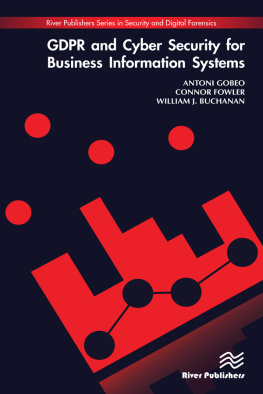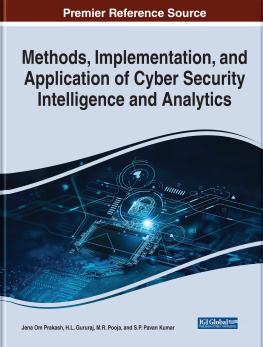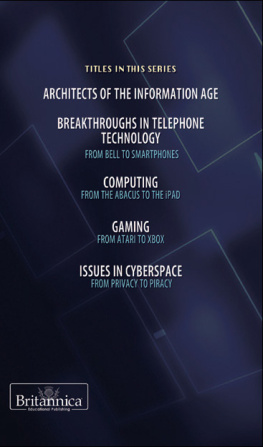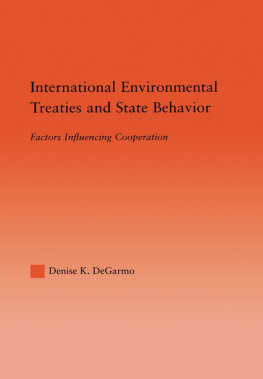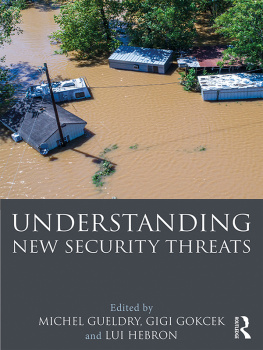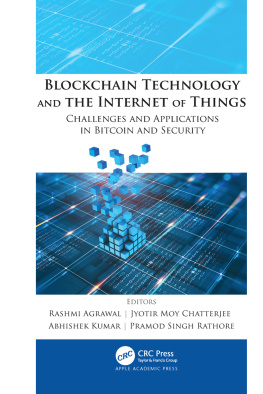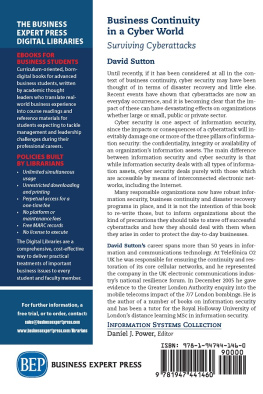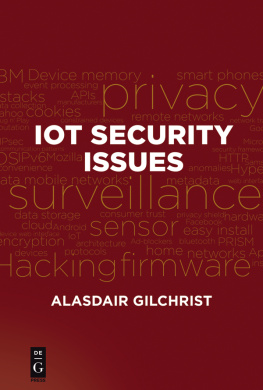POWER AND SECURITY IN THE INFORMATION AGE
Also of interest
The Resurgence of the State
Trends and Processes in Cyberspace Governance
Edited by
Myriam Dunn, Sai Felicia Krishna-Hensel and Victor Mauer
ISBN 978-0-7546-4947-2
Power and Security in the Information Age
Investigating the Role of the State in Cyberspace
Edited by
MYRIAM DUNN CAVELTY
Center for Security Studies, ETH Zurich, Switzerland
VICTOR MAUER
Center for Security Studies, ETH Zurich, Switzerland
SAI FELICIA KRISHNA-HENSEL
Center for Business and Economic Development
Auburn University, Montgomery, USA
ASHGATE
Myriam Dunn Cavelty, Victor Mauer and Sai Felicia Krishna-Hensel 2007
All rights reserved. No part of this publication may be reproduced, stored in a retrieval system or transmitted in any form or by any means, electronic, mechanical, photocopying, recording or otherwise without the prior permission of the publisher.
Myriam Dunn Cavelty, Victor Mauer and Sai Felicia Krishna-Hensel have asserted their right under the Copyright, Designs and Patents Act, 1988, to be identified as the editors of this work.
Published by
Ashgate Publishing Limited
Gower House
Croft Road
Aldershot
Hampshire GU11 3HR
England
Ashgate Publishing Company
Suite 420
101 Cherry Street
Burlington, VT 05401-4405
USA
Ashgate website: http://www.ashgate.com
British Library Cataloguing in Publication Data
Power and Security in the information age : investigating
the role of the state in cyberspace
1. Computer security 2. Information society 3. Information
technology 4. Cyberterrorism
I. Dunn Cavelty, Myriam II. Mauer, Victor III. Krishna-Hensel, Sai
Felicia
005.8
Library of Congress Cataloging-in-Publication Data
Power and security in the information age : investigating the role of the state in cyberspace / edited by Myriam Dunn, Victor Mauer, and Sai Felicia Krishna-Hensel.
p. cm.
Includes bibliographical references and index.
ISBN 978-0-7546-7088-9
1. Computer security. 2. Information society. 3. Information technology. 4. Cyberterrorism. I. Dunn, Myriam. II. Mauer, Victor. III. Krishna-Hensel, Sai Felicia.
QA76.9.A25P68 2007
005.8--dc22
2007018839
ISBN 978 0 7546 7088 9
ISBN 9781409498483 (ebk-ePUB)
Printed and bound in Great Britain by MPG Books Ltd, Bodmin, Cornwall.
Contents
Myriam Dunn Cavelty and Elgin M. Brunner
Myriam Dunn Cavelty
J.P. Singh
Geoffrey L. Herrera
Maura Conway
Manuel Suter
Myriam Dunn Cavelty and Victor Mauer
List of Contributors
Elgin M. Brunner is a Ph.D. candidate and researcher at the Center for Security Studies (CSS), ETH Zurich (Swiss Federal Institute of Technology). She holds a degree in International Relations from the Graduate Institute of International Studies in Geneva. She specializes in Gender Issues in Security Studies, Information Operations, the changing nature of warfare, and the societal impact thereof.
Maura Conway is lecturer at the Department of Law and Government at the Dublin City University. Her research interests are in the area of terrorism and the Internet. She is particularly interested in cyberterrorism and its portrayal in the media, and the functioning and effectiveness of terrorist websites. Along with a number of book chapters, she has also published in First Monday, Current History, the Journal of Information Warfare, and elsewhere.
Myriam Dunn Cavelty is head of the New Risks Research Unit at the Center for Security Studies (CSS), ETH Zurich and coordinator of the Crisis and Risk Network (CRN). Her field of expertise is the impact of the information revolution on security policy issues. Myriam holds a degree in political science, modern history, and international law from the University of Zurich.
Geoffrey L. Herrera is Visiting Research Fellow at the Center for the Study of Force and Diplomacy at Temple University, in Philadelphia, USA. He is the author of a number of articles on technology, international transformation, and international systems theory and of Technology and International Transformation: Railroads, the Atom Bomb, and the Politics of Technological Change from SUNY Press.
Sai Felicia Krishna-Hensel is Director of the Interdisciplinary Global Studies Research Initiative, Center for Business and Economic Development, Auburn University, Montgomery, and President and Program Chair of the Comparative Interdisciplinary Studies Section of the International Studies Association, United States.
Victor Mauer is Deputy Director and Head of Research of the Center for Security Studies (CSS), ETH Zurich, and heads the Centers European Security and Defence Policy (ESDP) project. He specializes in European security, European integration, and transatlantic relations and has published on European and transatlantic affairs. He studied at the Universities of Bonn, Oxford, and Cambridge.
J.P. Singh is Assistant Professor in the Communication, Culture and Technology Program at Georgetown University and Editor of Research Policy Review. Singh authored Leapfrogging Development? The Political Economy of Telecommunications Restructuring and co-edited (with James N. Rosenau) Information Technologies and Global Politics. His current book project is titled Negotiating the Global Information Economy. He has authored nearly thirty journal articles and book chapters. He is Chair of the Science, Technology and Environmental Politics section of the American Political Science Association; President of the International Communication Section of the International Studies Association; and Vice President of the Policy Studies Organization.
Manuel Suter is a Ph.D. candidate and researcher at the Center for Security Studies (CSS), ETH Zurich. He specializes in information security and Critical Information Infrastructure Protection (CIIP). Manuel holds a degree in political science, modern history, and constitutional law from the University of Zurich.
Preface
Cybersecurity: Perspectives on the Challenges of the Information Revolution
Sai Felicia Krishna-Hensel
The concept of world politics as essentially a struggle for power between nation-states marked the intellectual dialogue of the post war period as scholars sought to understand the forces that had resulted in the transformational conflicts that had changed the world as they had known it. Disillusioned with idealistic interpretations of the world order, greater emphasis began to be placed on a realistic approach where conflict and power plays were a dominant feature of world politics. The political realism of scholars such as Edward Hallett Carr, George Kennan, Hans Morgenthau, and Robert Gilpin among others, have reflected a general disenchantment with the prevalent tradition of scholarship which had confidence that rational human beings could construct effective institutions to promote order in the international system. Realist theory emphasized the importance of military strength as an index of state power. The principal actors in this competitive international system were states that were engaged in ensuring their own security, wealth, and power. Simultaneously, however, historians focused on the wars and the interwar periods as proof that the nation-state was increasingly finding itself challenged for supremacy and control over events that originated beyond its borders and whose impact transcended national boundaries. The idea of an international society gained momentum from the experiences of this period. The communication between peoples, the movement in ideas and cultural contacts, as well as in trade and commerce, had become easier and more rapid. Just as the national order replaced the localism of the medieval system, the study of politics in the twentieth century moved toward the idea of global cooperation and interdependence. This perspective recognizes that there has been an on-going evolution in the recognition by many national governments, international institutions, and non-governmental actors that they would need to work together to confront global problems. This constructive approach reflected an optimistic attitude concerning the ability of states to engage in cooperative efforts and presented a viable alternative to political realism.
Next page

